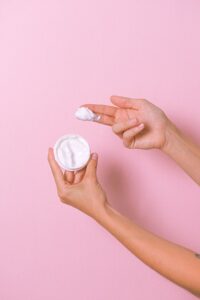Signs to Look For

Moisturizing is especially important for those with dry skin. Without proper hydration, dry skin can become flaky, itchy, and uncomfortable. However, over-moisturizing can have adverse effects on the skin, leading to clogged pores, breakouts, and other issues. Knowing the signs of over-moisturizing can help you adjust your skincare routine and keep your skin healthy and glowing.
Signs You May Be Over-Moisturizing
Here are some signs that indicate you may be over-moisturizing:
- Your Skin Feels Oily: If your skin feels excessively oily or greasy, even after you have washed your face or used a toner, it may be a sign that you are using too much moisturizer. Over-moisturizing can clog pores, leading to acne and breakouts.
- You are Breaking Out: Another common sign of over-moisturizing is frequent breakouts. If you notice an increase in the number of pimples or blackheads on your skin, it may be a sign that your moisturizer is not being absorbed properly, and excess oil and dirt are being trapped in your pores.
- Your Skin Feels Sticky: If your skin feels sticky or tacky to the touch, it may be a sign that you are over-moisturizing. This is especially true if you are using a heavy moisturizer that is not being fully absorbed into your skin.
- Your Skin Looks Dull: Over-moisturizing can also make your skin look dull and lifeless. When your skin is over-hydrated, it can become puffy and lose its natural glow.
- Your Skin Feels Tight: If your skin feels tight or dry, even after you have applied moisturizer, it may be a sign that you are not using the right type of moisturizer for your skin type. Over-moisturizing can also strip your skin of its natural oils, leading to dryness and irritation.
Prevent Over-Moisturizing
So, what can you do to prevent over-moisturizing? Here are a few tips:
- Know Your Skin Type: Understanding your skin type is essential to selecting the right moisturizer. If you have oily skin, you may want to use a lightweight, oil-free moisturizer. If you have dry skin, you may need a heavier, more emollient moisturizer.
- Use the Right Amount: Applying too much moisturizer can lead to over-moisturizing. Use only a pea-sized amount of moisturizer, and be sure to massage it into your skin until it is fully absorbed.
- Avoid Heavy Moisturizers: Heavy, greasy moisturizers are more likely to clog pores and cause breakouts. Look for moisturizers that are lightweight and non-comedogenic.
- Pay Attention to Your Skin: If you notice any of the signs of over-moisturizing, such as oily skin or breakouts, adjust your skincare routine accordingly. You may need to use less moisturizer or switch to a different type of moisturizer.
- Don’t Skip Exfoliation: Regular exfoliation can help to remove dead skin cells and prevent clogged pores. Use a gentle exfoliating scrub once or twice a week to keep your skin looking healthy and radiant.
To maintain healthy skin, it is important to find the right balance of hydration. Using a moisturizer that is appropriate for your skin type and using the correct amount can help keep your skin healthy and glowing. Regular exfoliation can also help to remove dead skin cells and prevent clogged pores, leading to healthier, clearer skin. By knowing the signs of over-moisturizing and following the tips outlined above, you can keep your skin healthy, hydrated, and glowing. Remember to pay attention to your skin and adjust your skincare routine as needed to keep it looking its best.




